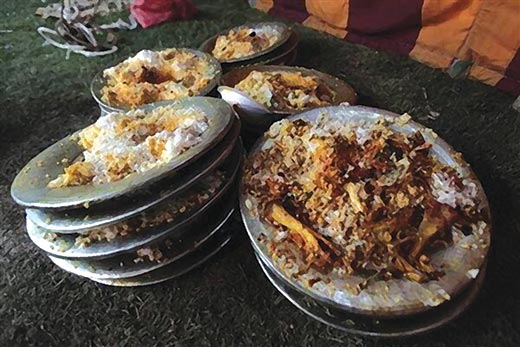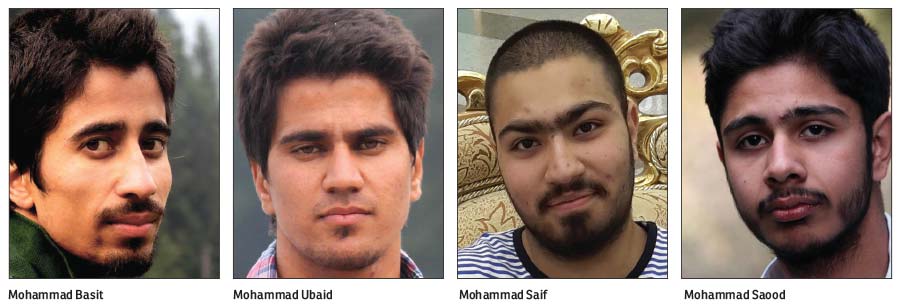Despite producing only a fraction of what we consume Kashmir conveniently wastes thousands of tonnes of food every day. Mohammad Raafi meets four cousins who salvage surplus food from the haves to feed the have-nots of the society
 In Srinagar city alone 600 metric tons of waste is generated every 24 hours. And almost half of it directly comes from our kitchens! In a consumer based society like Kashmir, which produces only a fraction of what it consumes, wasting such a huge quantity of food everyday is painful.
In Srinagar city alone 600 metric tons of waste is generated every 24 hours. And almost half of it directly comes from our kitchens! In a consumer based society like Kashmir, which produces only a fraction of what it consumes, wasting such a huge quantity of food everyday is painful.
Disturbed and driven by the same pain four cousins from the Srinagar suburbs, Mohammad Saaif, Mohammad Ubaid, Mohammad Baasit and Mohammad Saood, launched, Sadqaa, a movement against reckless squandering of food.
The aim is quite simple: to collect the hygienic surplus food from restaurants, marriage ceremonies and parties, and circulate it among the downtrodden of the society.
“It was shocking to see such a huge amount of food wasted despite the fact that thousands of people go to bed hungry,” says Baasit, the co-founder of Sadqaa, a software engineer by profession. “There is clear disparity between the haves and have-nots in our society.”
The group wanted to bridge this gap by opening a distribution channel between those who have surplus food and those who have none. “The idea was to reduce food waste and put it to effective use,” says Baasit.
Baasit shared this idea with his three teenaged cousins who readily agreed to become part of the team. The organization runs on two fundamental principles: quality and respect.
“Whenever we go out to distribute food among the poor, we make sure we do it with humility, as self-esteem is central to the existence of every human being,” asserted Saaif, one of the four group members who studies in 12th standard.
As of now the focus of Sadqaa is to make healthy use of wasted but hygienic surplus food that otherwise finds its way into our dustbins. “Imagine if we could use all the food wasted across Kashmir and distribute it among those who need it, how much resources we will save,” says Baasit. “It would help unburden our already scarce food resources.”
In order to kick start their campaign the cousins launched a facebook page to propagate their mission. Within no time an elderly person from uptown (Srinagar) left them a message on their page about the availability of surplus Waazwan at his house. “I collected the food from his house on my way back home from work,” recalls Baasit, “It was May 2015.”
The food was then distributed among needy people living in the vicinity of Baasit’s locality. Encouraged by the response group prepared a list of impoverished localities and slums in and around Srinagar. “We have also served a number of underprivileged families in the city,” says Baasit.
With no funds available, all expenses including transportation of food from a donors house to the consumer, is done by the group’s founders themselves. “We are managing it from our own pockets,” says Baasit.
During the holy month of Ramzaan, Baasit and his cousins were continuously on their toes distributing meals among the needy. “We managed everything on our own without any external funds,” says Ubaid, a science graduate, who managed time for the ‘mission’ despite without compromising his studies.
The strategy adopted by the group was simple : one or two members would travel around the city during day to identify the areas where food can be distributed. And in the evening the group would start distribution of the food in these areas. “Almost all the Iftars (evening meals) were sponsored by the people of Srinagar,” says Ubaid. “People are willing to donate; it is just that they had no credible platform until now.”
The entire process of transportation of the food was done by the group members in their personal vehicles, leaving a considerable dent in their monthly budgets. After the success of group’s Ramzaan food distribution efforts, people in large numbers are coming forward to donate the surplus food. “Positive response from people encourages us to keep going,” says Saaif.
Next step that the group is considering to take their mission forward is managing the wastage of food during marriage ceremonies in Kashmir. “The amount of food we waste during marriage ceremonies is considerable. If we can manage it properly nobody in Kashmir has to sleep on a empty stomach,” believes Baasit.
The group is hopeful that the success of Sadqaa will prompt others to replicate their module in their respective areas. “The success of Sadqaa clearly shows that people are willing to help those in need of help. It shows that we are not dead as a society after all,” feels Ubaid.
The youngest member of the group, Saood, a class 10th student, has different take on the failure of people to take food wastage issue seriously. “Instead of finding small doable ways of addressing a problem, people come up with grand plans. And honestly such grand plans hardly work once you start working on the ground.”
The group is currently working on a number of plans to make Sadqaa a success, with its presence across Kashmir. The major one is to collaborate with restaurants, marriage and banquet halls, local community heads and hire paid volunteers, so that the surplus food can be salvaged for the needy. “We are also launching a mobile application so that the communication gap between a donor and a receiver can be bridged,” says Ubaid.
The group is also planning to launch food awareness drives across the state in coming days. The other major plan in the pipeline is to rope in all major cafeterias and restaurants operating in universities across Kashmir. “The idea is to encourage students donate five rupees at the counter while paying for food. The cashier will give them a receipt for their contribution which will be deposited in the Sadqaa donation box,” says Baasit.
This initiative will help group generate a considerable amount of money, which will be used to feed the underprivileged of the society, says Baasit.
 However, they also acknowledge that as students, they face a plethora of constraints in terms of their expansion plans. “One major issue is the time constraint,” says Baasit.
However, they also acknowledge that as students, they face a plethora of constraints in terms of their expansion plans. “One major issue is the time constraint,” says Baasit.
The group finds it difficult to manage between their studies, family affairs, and the work they intend to do to help the poor. There are other major challenges like lack of manpower, finances, transportation and storage of food for hygienic consumption. “The working module of Sadqaa is very simple. Any volunteer can do it independently given he/she is dedicated,” says Baasit. “We understand that we cannot reach out to every person. But we want to do our bit irrespective of the results.”















